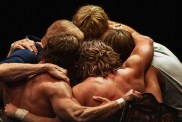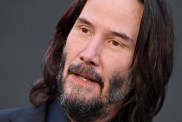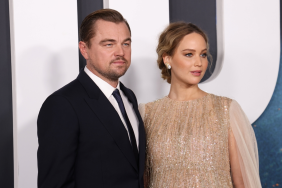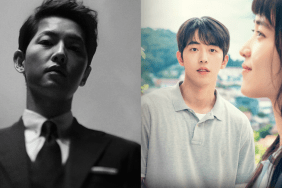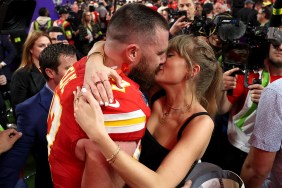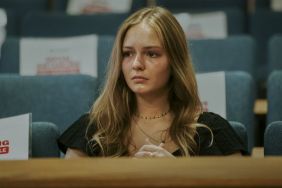Your impressions of British literary icon Jane Austen might be largely biased by your gender, because she’s very much an author loved by women and feared by men for the views on love and relationships she instills into her female readership. That said, you have to admit that there have been an abundant amount of great movies and television series based on her works, which is why it’s surprising that she’s remained such a mystery in terms of her own background. Becoming Jane tries to set that right. Directed by Julian Jarrold of Kinky Boots fame and starring Anne Hathaway as the beloved author, the pseudo-biopic tries to assemble the pieces of Austen’s life in order to explore the source of inspiration for her novels. It mainly does so by examining the relationship between Austen and one Tom Lefroy, an Irish lawyer-slash-pugilist played by Scottish actor James McAvoy.
Recently, ComingSoon.net attended a press day with Anne Hathaway, who’s always a delight to talk to because she’s very outspoken and free with her opinions, and talk about her movie quickly turned into inquisitions about her perpetually successful career. Although most of the latter questions were asked by tabloid types, Hathaway handled the inquisition about her own life and career with her typical aplomb.
ComingSoon.net: Did you have to do a lot of research when taking on this part?
Anne Hathaway: (joking) Nah, I just wing it. I studied her work in school, both high school and to a greater degree, in college, for those blissful 15 minutes that I was there. I was ashamed when I read the script that I’d never been more curious about her life actually. I just assumed that I knew her because of her work. I accepted the two-line biography, “Jane Austen lived 41 years, published 5 novels, never married.” I might have just condensed that to one line. (laughs) I wondered, “Why don’t I?” and then when you do the research, you find out that so many of her letters were destroyed, which made her sort of a permanent enigma, but I had no idea that she was ever proposed to. I had no idea that she even had flirtations. I don’t know why. It just never really occurred to me to think about that. I inherited the image of Jane Austen as a sort of dried-out old spinster and in doing my research, I found out that she was anything but that. She was wonderfully alive, very fun, a bit naughty, and so much more alive than I ever thought. It was wonderful the idea of playing the woman before the icon.
CS: When you were cast as Jane, did you watch any of the films based on her novels and did you derive anything from them?
Hathaway: Oh, yes. A lot of anxiety, that’s what I derived. (laughs) My favoriteand I gotta keep it in the familyis “Sense and Sensibility.” Just everything about that movie is as perfect as it could have been. That’s an extraordinary film. I also loved “Persuasion,” the BBC version with Amanda Root, I thought she was an absolutely delight, and I really love that one. I loved “Persuasion” because I think it’s a little bit bleaker than the others but it’s also beautiful to get caught up in Ann Elliot’s transformation. In fact, it was “Persuasion” that convinced me I was really doing the right thing by telling this story. Tom Lefroy was born in Ireland and maybe this is nothing and maybe I shouldn’t have hung my hat on this one fact, but in the story, Ann Elliot is attending a concert, and Captain Wentworth has arrived and everyone is so impressed with him, including people who disliked him before because he was poor. He arrives and Catherine overhears someone talking about him, someone who had previously denigrated him, and this person said, “Oh, who is that very impressive young man? He has an air about him. Irish I would think.” I don’t know if that has anything to do with Tom Lefroy, but it seemed fitting. And so, “Persuasion” meant a lot to me when I was making this movie. Also, I thought the recent adaptation of “Pride & Prejudice” was an absolute delight. I think Keira Knightly was heaven in it and I think Joe Wright is genius and I can’t wait to see “Atonement.”
CS: Since these sorts of movies tend to use a lot of artistic license, how much of this story is real?
Hathaway: At the end of the day, some people say it’s all fiction. She did have a relationship with Tom Lefroy, but that’s all we know. We’re not deliberately trying to mislead the world about Jane Austen. We really did as much as we could with the information we have. It’s very plausible that something like this could have happened. It’s equally possible that it didn’t. For me, yes it’s a love story and yes, I’m sure that did have some influence on her and her life but moreso than that, it’s a portrait of an artist. I thought how wonderful to get to see Jane’s relationship with Cassandra, Jane’s home, which I think we did rather well, her contemptuous relationship with her mother, her standing in society, her frustrations at her poverty. There were so many more specific attributes to her life that I think informed or could have had an influence on her as an artist, that I thought it was fun to explore that. I don’t feel comfortable saying it’s completely made-up but I also can’t say everything in this story is 100% true.

CS: How hard did you have to work to get the British accent?
Hathaway: It was the thing that I knew people would talk about the most. “Oh, here’s this young American upstart playing a beloved British icon.” I figured if I didn’t get that right than the rest of the performance wouldn’t matter because people would write me off in the first five minutes. I worked really hard on the accent. I moved to England for a month beforehand to really immerse myself. In the beginning, I felt really stupid staying in the accent the whole time, so I sort of had a hybrid going on, which was even more distracting. So by the end, I kind of sussed everyone out. Everyone was really comfortable with me staying in the accent the whole time, so once I could get over my own feelings that I was a poser, it got a lot more comfortable. I really owe a lot to the rest of the cast, who would sit there and coach me through dinners. I had a wonderful dialect coach, she was unbelievable. I will say with no small amount of pride that I felt when Julie Walters told me I was doing a great job with the accent, when she said “oh, no, you have it, you’ve nailed it, you’re there.” She said this to me before we started filming, that kind of felt like a little blessing. Phew! It felt good.
CS: Did you have any concerns about how the British press would view you in this role and has anything been said there similar to when Renée Zellweger and Gwyneth Paltrow played British authors?
Hathaway: Yeah, quite a few people. I’d lie if I didn’t say that it was something that was in the back of my mind, but there’s a lot more going on than worrying about what the press were saying about my casting. I was there every day with the reality of playing this character and that had to be my primary concern, not what the press were saying about me. I don’t think it’s had a huge impact on the reviews. I’m sure for some people it did, but I think for a majority of people, it didn’t. They either liked me or hated me on my own merit. (laughs)
CS: Can you talk about how you established chemistry with James McAvoy and were you able to shoot the scenes sort of in order with the way they happened in the movie?
Hathaway: (laughs) No, no one cares about putting scenes in order to help us out. That’s the least of their concerns. It’s funny. The questions that people ask about chemistry. There’s no formula to it. It’s not like getting into a character of finding an accent or choosing what costumes your character would wear. It’s really something much more intangible. I like James. I really like James McAvoy as a person. I think he’s smart, terribly clever, a lot of fun, a brilliant actor and so, I just enjoy spending time with him, maybe that’s what came through. Maybe he and I understood our characters well enough that we were able to let that relationship come through. Who knows? But it’s nice to watch.
CS: Americans seem to love the quaint lifestyle of the British during this time period, but do you think that women of today would really want to live in the times in which Austen’s family lived?
Hathaway: Well, no, a 21st Century woman, everyone would complain ad nauseum, not least about the drafts, the corsets and the oppression for women (laughs). I mean, I would have kicked up a big storm. That being said, from what I understand, Jane Austen was happiest when she was in the country. She was in her middish ’20s when her parents decided to move to Bath and she was very unhappy there, didn’t write for ten years, and when she moved to Chawton afterwards, which is very similar to Hampshire, pretty close to it as well, that’s when she really began to write again. I guess for certain people, it absolutely had its benefits. But no, as a 21st Century (woman), even with the civility that existed then, there was a grace. Even the pace that existed then was so much more human than the one we live in now. There have been human breakthroughs that I wouldn’t give up for the world, and I don’t think many people would.
CS: Can you talk about the need for women to get married in Jane Austen’s time due to the amount of poverty and the divide between the class structure?
Hathaway: First of all, let me say how truly flattered I am that you think I’m aware of economic history (laughs) or that I’m any kind of expert that can be talking about it in any capacity, so thank you. Let me assure you that I’m not, so this answer is probably going to be awful. (laughter) There was a real necessity back in Jane Austen’s time that you had to be taken care of by a man. If you inherited your own money, you had to marry at least someone who had as much money as you, but it wasn’t seen as an advantageous match unless you married up. Nowadays, I can’t speak for other women, but it’s not a necessity particularly in America, many women don’t feel comfortable being taken care of. A lot of women only feel comfortable having men pay the bill as long as they know they have it in their own bank account, that they could pay the bill. I’m one of those. (laughs) I don’t mind being taken care of as long as I can take care of myself, and for me, that’s important. I think we have made great strides that women are independent enough to be able to make their own lives. Barbara Feldman (who first played Agent 99 on “Get Smart”, a role that Hathaway is currently shooting), she wrote a book called “Living Alone and Loving it” and it’s about the art of living alone and supporting yourself, of having the most important relationship in your life be with yourself. Nowadays, it’s something to be celebrated. In Jane Austen’s time, it was something to be ashamed of. I think it’s not as rosy to say that everyone celebrates it. I’m not that naïve, but I think it’s gaining wider acceptance and I think that’s a good thing. I think everyone should be free to live life as they want.

CS: You seem to have lived a fairly comfortable life yourself with very few real hurdles.Hathaway: I’m a private person and one of my mantras in life is from the brilliant Oscar Wilde. He says, “The less said about life’s sores the better.” I prefer to talk about the nice things that have happened to me and I’m very grateful and I feel very blessed in my life, but no, it hasn’t been one big easy wonderful ride. Compared to a lot of people in the world, yes it has been one big easy ride, but there have been hidden moments in there, too. I assure you, I’m not that annoying.
CS: Do you ever think to what you owe your success?
Hathaway: I used to say ‘luck’ and then Pete Segal said that if I said that one more time, he’d hunt me down. I’ve been very fortunate and being fortunate is very different from being lucky. It’s difficult for me to accept that, but really, choices that people didn’t expect to pan out that I made did pan out. I’ve been just as surprised as anyone. It’s absurd that I’m as successful that I am as young as I am and now I’m getting to that level of success where it’s absurd that it exists at all. I really don’t know what to say. I love my job. In some ways, I have accomplished as much as I ever meant to in my career, and I really get to work with exciting, interesting people every day and talk about art and try to find truth.
CS: Have you had any of the sort of problems that Jane Austen had because of your fame?
Hathaway: I appreciate your concern (laughter) but sometimes, I am surprised that people aren’t struck by the absurdity of all the attention that are paid to people for doing nothing, for doing normal things, for going to the grocery store. It seems absurd to me, I can laugh at it. No one’s every tried to jump out at the bushes and tried to scare my child. The second someone does that, the second someone harasses a family member or rifles through their garbage or makes anyone in my life that’s not me feel uncomfortable, it goes into the realm of what you’re talking about. That being said, just because you lead a public life doesn’t mean you can’t keep things private. I’m a very open person, but at the same time, I don’t reveal too much, and I’m very comfortable saying, “I’m not going to go there.” I’d rather give up my career than talk about what you’re asking me about. I don’t mean to make it that dramatic but nowadays, this is what we’re faced with. I don’t believe in all that malarkey that it’s the “life that you’ve chosen” ’cause when I grew up, my understanding of being an actress didn’t mean being a celebrity. I’m very lucky ’cause I’m still in a place where I can engage and disengage in it. We’ll see how that continues in the future. I’m sure at some point, I will be forgotten and it’ll probably be during my own life and hopefully, by protecting my own privacy, I will have a completely separate life that’s rich and fulfilling at the same time.
Becoming Jane opens in select cities on Friday, August 3.
